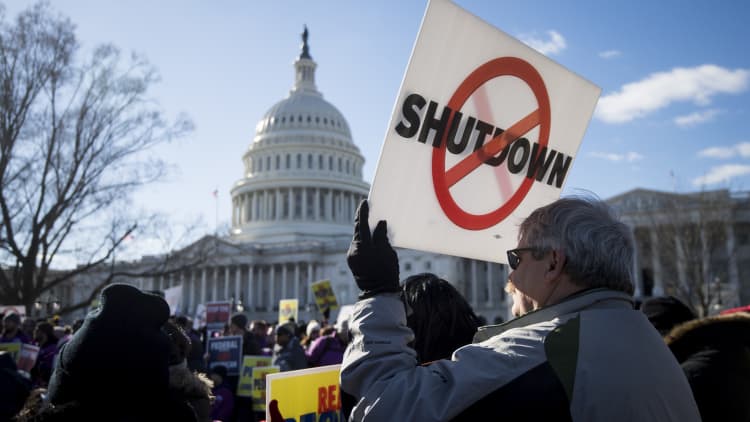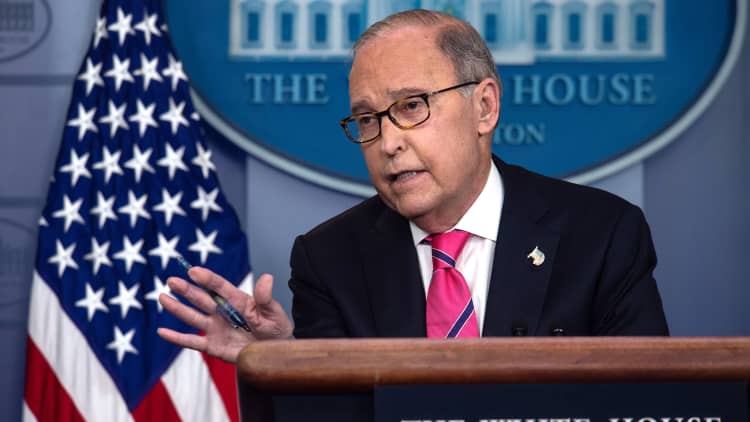
The financial shock is about to get much worse for government employees sidelined by the budget stalemate in Washington.
If the partial government shutdown continues through this week – and there is no end in sight – Friday will mark the second paycheck missed by affected federal workers, whose household budgets have been completely upended.
An estimated 800,000 government employees have been caught in the political crossfire of the shutdown, now in its fifth week. Roughly 380,000 federal workers have been furloughed and 420,000 are working without pay.
The impact of the government shutdown on the overall U.S. economy, so far, has been limited. Yet, just as the economic effect is concentrated on furloughed workers, some companies and industries are taking a bigger hit than others. Commercial airlines, for example, are facing slower demand as airports struggle with understaffed security checkpoints, are losing revenue. Last week, Delta said it had lost $25 million in revenue on account of the shutdown.
The hit to the overall gross domestic product in the first quarter is also difficult to quantify. Economists have come up with a range of numbers, but they agree that the longer the shutdown goes on, the wider the damage to economic growth.
There was little indication Tuesday that the standoff would end anytime soon. President Donald Trump's proposal to reopen the government, which outraged immigration hard-liners on the right and was instantly rejected by Democrats, is headed for a vote this week in the Senate, where it will probably fail.

The bill, which includes funding for most domestic agencies, has immigration provisions aimed at mollifying Democrats but which have alienated some conservatives. It also includes money for Trump's proposed border wall, which Democrats oppose. Trump has said he would not sign a budget bill that excludes funding for the barrier.
In Corpus Christi, Texas, Haley Hernandez, a stay-at-home mother of four and wife of an active-duty member of the Coast Guard, told The Associated Press that she applied last week for free lunches for her children and was waiting for an electronic food stamps card in the mail.
"This is a first for us," Hernandez said. "Honestly, it's pretty shameful, I feel, that any government employee would have to ask for food stamps or any kind of assistance like that. You would think that they would take better care of their service members."
Hernandez said she's not sure how she'll make her $1,400 mortgage payment.
Missing payments to have cash on hand
Many furloughed federal workers will have little choice but to delay paying the mortgage or credit card debt, according to a study by University of Michigan economist Michael Gelman and four colleagues.
The study looked at the effects of the 2013 government shutdown on nearly 7,000 federal workers – both those affected by the shutdown and not – along with more than 90,000 nonfederal workers.
The researchers found that the median worker in the study had only enough cash or other liquid assets to cover just eight days of their average household spending. That cushion fell to just five days of spending just before payday. The bottom third of the group had, on average, a combined checking and savings account balance of zero on the day before their paycheck arrived.
That meant that delaying their mortgage payment was the only way to stay afloat, according to the study.
"Even if there are penalties or costs, late payment of a mortgage is a source of credit that is available without the burden of applying for credit," the authors wrote.
Overall, the affected workers didn't rely on credit cards to make up their lost wages, but postponed making payments on outstanding debt.
But that 2013 shutdown was over in two weeks. Furloughed workers in the current shutdown have already gone through a full monthly payment cycle. So those who miss credit payments now face late fees and the prospect of default.
The political stalemate has also prompted thousands of federal employees and their families to apply for unemployment and food stamps to get by. Last week, the number of furloughed federal employees seeking unemployment benefits jumped from fewer than a thousand per week before the shutdown to more than 10,000 during the week that ended Jan. 5, according to the Labor Department.
Other workers, who are hesitant to apply and expect to eventually get back pay, are busy juggling household budgets with no assurance when they will see their next check.
Will Kohler, a furloughed IRS tax examiner in Covington, Kentucky, applied for unemployment but ran into another kind of complication. His application is in limbo because the Treasury Department office that needs to verify his claim is closed as a result of the shutdown.
Kohler, who makes $38,000 a year, said many co-workers are in the same predicament. Not a single one has been approved for unemployment, he said. Kohler said workers like him are stuck in a difficult position, in part because they are restricted by government ethics rules from getting many kinds of outside work. "When it gets to a point where government employees have to go to a food bank, this is not the America that I grew up in," he said. "It's mind-boggling. It really is."

— The Associated Press contributed to this report.


